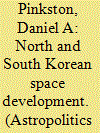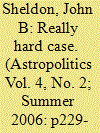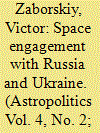|
|
|
Sort Order |
|
|
|
Items / Page
|
|
|
|
|
|
|
| Srl | Item |
| 1 |
ID:
074785


|
|
|
|
|
| Publication |
2006.
|
| Summary/Abstract |
Since the late 1990's the United States has maintained a strict policy of no cooperation with China on space activities. The reasons for that are several, including the desire to inhibit the development of dual-use technology considered potentially threatening to the United States and political reluctance to work with a communist country. Increasingly, however, it has become clear that policy is not constraining China from dual-use technology development and that the policy overall may be detrimental to U.S. security interests. Therefore a policy change, from a realistic consideration of circumstances, must be considered.
|
|
|
|
|
|
|
|
|
|
|
|
|
|
|
|
| 2 |
ID:
074788


|
|
|
|
|
| Publication |
2006.
|
| Summary/Abstract |
North and South Korea both have developed rocket technology for military and civilian applications, but their space programs differ in many important aspects. As late developing space powers, neither country poses a serious direct threat to U.S. space assets, but a successful U.S. cooperative engagement strategy towards the Koreas could help achieve U.S. policy objectives. The domestic politics of the two Koreas are very different, and Korean space development will depend upon a number of variables including inter-Korean relations and whether the two Koreas unify, domestic politics and budget constraints, the overall strategic environment, as well as opportunities for Korea in the realm of international space cooperation. The United States has opportunities to implement an engagement strategy in Korea, but it could be complicated by different U.S. objectives in North and South Korea, and by linkage to other issues. Despite the complexities, Washington should be prepared for a number of possibilities.
|
|
|
|
|
|
|
|
|
|
|
|
|
|
|
|
| 3 |
ID:
074784


|
|
|
|
|
| Publication |
2006.
|
| Summary/Abstract |
Traditional responses to international security concerns include the heightening of distrust, mutual disengagement, and arms deployment. Fortunately, serious threats to security in space do not yet exist. Therefore, an alternative means of diffusing possible problems may be cooperative threat reduction-a tool that has been used effectively by the United States and other countries since 1991 in dealing with the former Soviet Union's weapons of mass destruction legacy. This article analyzes the conceptual rationale for a similar approach to space threats. It also describes the results of a recent project to consider advantages and disadvantages of possible U.S. adoption of such policies with respect to seven current or emerging space rivals.
|
|
|
|
|
|
|
|
|
|
|
|
|
|
|
|
| 4 |
ID:
074789


|
|
|
|
|
| Publication |
2006.
|
| Summary/Abstract |
On 27 October 2005, the first Iranian satellite-Sinah-1-was launched. The satellite failed soon after launch, but it represented a significant technological step by the Islamic Republic, and was also a statement of intent on behalf of Iranian space ambitions. Current and projected Iranian space capabilities are highly dependent upon foreign technologies and expertise, but the Iranian nuclear and ballistic missile programmes offer a glimpse of how Iran's space programme may yet develop. This essay provides an overview of Iranian space capabilities, and places it within contemporary Iranian domestic and strategic contexts. It also offers an insight into how Iran's space programme is organized, and lastly, offers a view on how best the United States might influence Iran's space programme.
|
|
|
|
|
|
|
|
|
|
|
|
|
|
|
|
| 5 |
ID:
074787


|
|
|
|
|
| Publication |
2006.
|
| Summary/Abstract |
The collapse of the Soviet Union brought about a number of serious concerns that space and missile technologies-including weapons-related technologies-might be exported by Russia and Ukraine to states that might use them for hostile purposes. In fact, inadvertent contribution to ballistic missile programs through space collaboration and technology sharing is considered one of the major "routes" of missile technology proliferation. Incidentally, in the case of Russia and Ukraine, out of all the potential risks associated with technology transfers, proliferation of ballistic missile technologies has been the major concern for the Western nations, and engaging these two countries in joint space projects has been viewed as a powerful incentive to comply with missile nonproliferation norms and ideals.
|
|
|
|
|
|
|
|
|
|
|
|
|
|
|
|
| 6 |
ID:
074786


|
|
|
|
|
| Publication |
2006.
|
| Summary/Abstract |
The new strategic partnership between the United States and India is creating opportunities for security cooperation. A key element in this partnership—U.S.-India space cooperation—will most likely become the defining relationship for international space cooperation around which other space-faring nations will posture. The Indian space program is rapidly developing world-class capabilities and presents itself as a worthy partner. The U.S. space program should be able to provide innovative ideas for fruitful collaboration. Despite these propitious circumstances, there are potential obstacles of cost, security, and risk. The biggest obstacle, however, might simply be bureaucratic intransigence and inertia. The opportunity is here, now, for the United States and India each to add an important new jewel to their crown of international space cooperation activities. Most importantly, this new space partnership should enhance the security and prosperity of the United States, India, and the world.
|
|
|
|
|
|
|
|
|
|
|
|
|
|
|
|
|
|
|
|
|